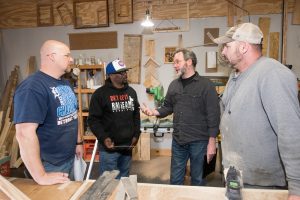Whether we realize it or not, we’ve all received or benefited from a second chance at some point in our lives. Unfortunately, not everyone is as quick or generous to extend a second chance when it comes to helping convicted felons return to society in a constructive and productive manner.

These are the friends, relatives, neighbors and strangers who make up – or destroy – the families and neighborhoods that Detroit strives to rebuild. I believe we all need to extend a helping hand to them. It can be a major turning point for the individual and the community at-large.
The Michigan Department of Corrections reported a burgeoning prison population of 43,704 in 2013, the most recent year of statistics made available by the state. Michigan’s 35 prisons house more than 30,000 prisoners for violent crime, an estimated 10,000 for nonviolent offenses, and just over 3,000 are imprisoned for drug crimes. There has been discussion on both sides of the isle to release those of lesser offenses and are contributing to prison overcrowding.
For a few years, I have had the privilege of presenting workshops to the female participants of Flip the Script, a program of Goodwill Industries of Greater Detroit for those seeking second chances and the opportunity to redirect their lives. I also recently interviewed native Detroiter and Kellogg and MIT Fellow Shaka Shenghor, author of Writing My Wrongs,which chronicles his life after spending 19 years in prison for murder.
Over the years, I have learned much about the challenges faced by those in and coming out of the system. All of them are microcosms of the issues faced by many, if not all, of those trying to turn their lives around. I have learned that the solution is a layered one that begins and ends with an understanding and respect for the persons, their challenges, and their desire to return to some degree of normalcy in their life.
Shenghor clearly states a person or organization must take into consideration every facet necessary to return to the community or fail at assisting those who are trying to do so. It’s more than identifying job opportunities. There are mental, social, emotional and spiritual awareness issues to be considered as well as the engagement, responsiveness and support required to solidify the transition. It begins with talking to – and listening to – those who are there or have been there.

I sincerely believe a communal willingness to forgive is necessary. It starts with the difficult but necessary conversation about how we both welcome and incorporate ex-convicts back into our community, including removing the prejudicial feelings and actions towards them. Shenghor is one of many who returned from prison, leaving the life that put them there behind.
In 2015, the U.S. Labor Department awarded the State of Michigan and Detroit a $5-million grant aimed at helping ex-offenders who’ve served their time get back into the workforce. The grant will help Detroit establish a job-training and placement initiative, initially focusing on getting 1,500 residents into full-time jobs. That is a major start toward rebuilding their lives.
The incorporation of other wrap-around, support services will not only assist with the individual constructively returning to the community, it will be major step towards building and sustaining a safer and more productive Detroit for everyone.
We all deserve and should be willing to extend a second chance.
Editor’s Note: Karen Dumas is host of “The Pulse,” heard M-F from 4-7 PM (EST) on 910AM. The former chief of communications for the City of Detroit, she is also owner of the PR firm, Images & Ideas, Inc.



Personally, I prefer to apply my available time and resources to help people that haven't murdered somebody and terrorized the community that they lived in. If you want to demonstrate to me that you've changed your ways, then bust azz and make it happen the right way without an assortment of special services because of the threat of you being worst if you don't get the help.
Don't murder somebody, then write a book telling me how tough jail was and what you suffered in there. I just don't feel sorry for you and I don't owe you sh*t unless you murdered one of mine.
Really great post. This answered the majority of my questions. When I read this I actually opened up a word document and started taking notes haha.